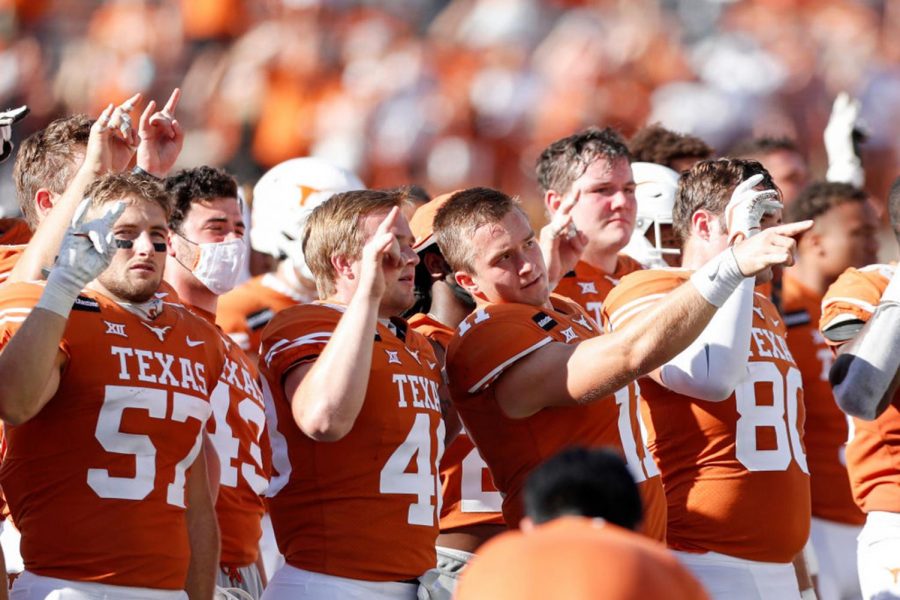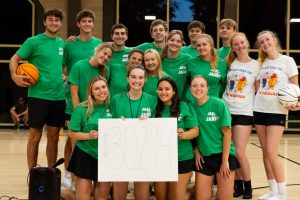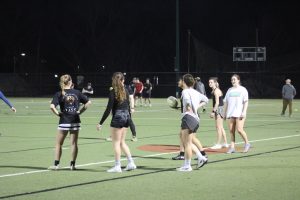Texas fight song sparks racial controversy
UT Austin responds to complaints about school fight song’s racist history
Texas Longhorns standing for “The Eyes of Texas” after a game against the West Virginia Mountaineers on Nov. 7.
March 11, 2021
Before and after every home football game for the University of Texas at Austin, the assembled Longhorn faithful join in singing “The Eyes of Texas.” Yet, for some of the players for whom tens of thousands cheer, the song’s roots in racist performances and white supremacy contravene the values of diversity and inclusion the school claims to uphold.
Dozens of these student-athletes organized together and refused to participate in recruiting or development events if measures aimed at increasing diversity and rectifying the institution’s history of segregation and racism were not implemented.
Some of these demands, such as the renaming of a physics and math building named for a segregationist professor, were met. However, the final request to stop the playing of “The Eyes of Texas” was refused and quickly became a cultural flashpoint.
After UT declared their intention to continue playing the song in July, members of the band responded with a boycott that resulted in the suspension of the whole group for the entire season. Additionally, players on the football team returned to the locker room instead of joining in the stadium-wide singing. The controversy over the song boiled over following a loss to Oklahoma when quarterback Sam Ehlinger remained on the field while the rest of his team returned to the locker room.
Now, emails obtained from the Texas Tribune demonstrate how this visible depiction of protest enraged the most powerful interest group of the university: the wealthiest donors.
Donors threatened to cut off all support to the school if the anthem was eliminated, with some espousing racist rhetoric arguing that the interests of donors should be prioritized over student-athletes.
“It’s time for you to put the foot down and make it perfectly clear that the heritage of Texas will not be lost,” wrote one alumnus from the class of 1986, whose name was redacted by the university. “It is sad that it is offending the Blacks. As I said before, the Blacks are free, and it’s time for them to move on to another state where everything is in their favor.”
“Less than six percent of our current student body is Black,” wrote another donor. “The tail cannot be allowed to wag the dog … and the dog must instead stand up for what is right. Nothing forces those students to attend UT Austin. Encourage them to select an alternate school … NOW!”
Through the university denies the racist emails had any impact on the decision to keep the song, they remain indicative of the widespread belief that the song is immutable and irremovable. New head coach Steve Sarkisian, who inked a six-year contract worth more than $34 million, has been outspoken in his support of the song.
“The Eyes of Texas’ is our school song. We’re going to sing that song,” Sarkisian said, “We’re going to sing that proudly.”
Before the song became a Texas mainstay, it was an indicator of the racism entrenched in 19th century American entertainment. On May 12, 1903, a quartet of students in blackface performed “The Eyes of Texas” for the first time in a minstrel show. The racist performance gained widespread popularity in antebellum America.
The author of the song, John Sinclair, was the program director for the Varsity Minstrel Show that served as a fundraiser for the track team. He wrote the song to parody UT president William L. Prather, who closed his speeches by saying, “Remember, the eyes of Texas are upon you.”
Prather has continuously cited inspiration from Robert E. Lee, the university president at Washington University, who supposedly said, “The eyes of the South are upon you” at the conclusion of each of his addresses.
But a new report from a 24-person committee tasked with analyzing the history of the anthem cast doubt on that narrative, concluding the phrase may have been inspired by another Confederate general who told his Texan soldiers, “The eyes of General Lee are upon you!”
For the players who boycotted last summer, the debate over the song’s racist roots is secondary to the vitriol received after speaking out. In an interview with Jemele Hill of The Atlantic, junior linebacker DeMarvion Overshawn described the messages he received in response to his actions, which included threats and racist language.
“They say, ‘You shouldn’t be here’; ‘Leave’; ‘I’m going to do this and that to you,’” Overshown said. “They’ve called me all types of N-words, B-words.”
The university released a comprehensive 59-page report Tuesday explaining the complex history of the school song, that concluded there was “no racist intent.”














